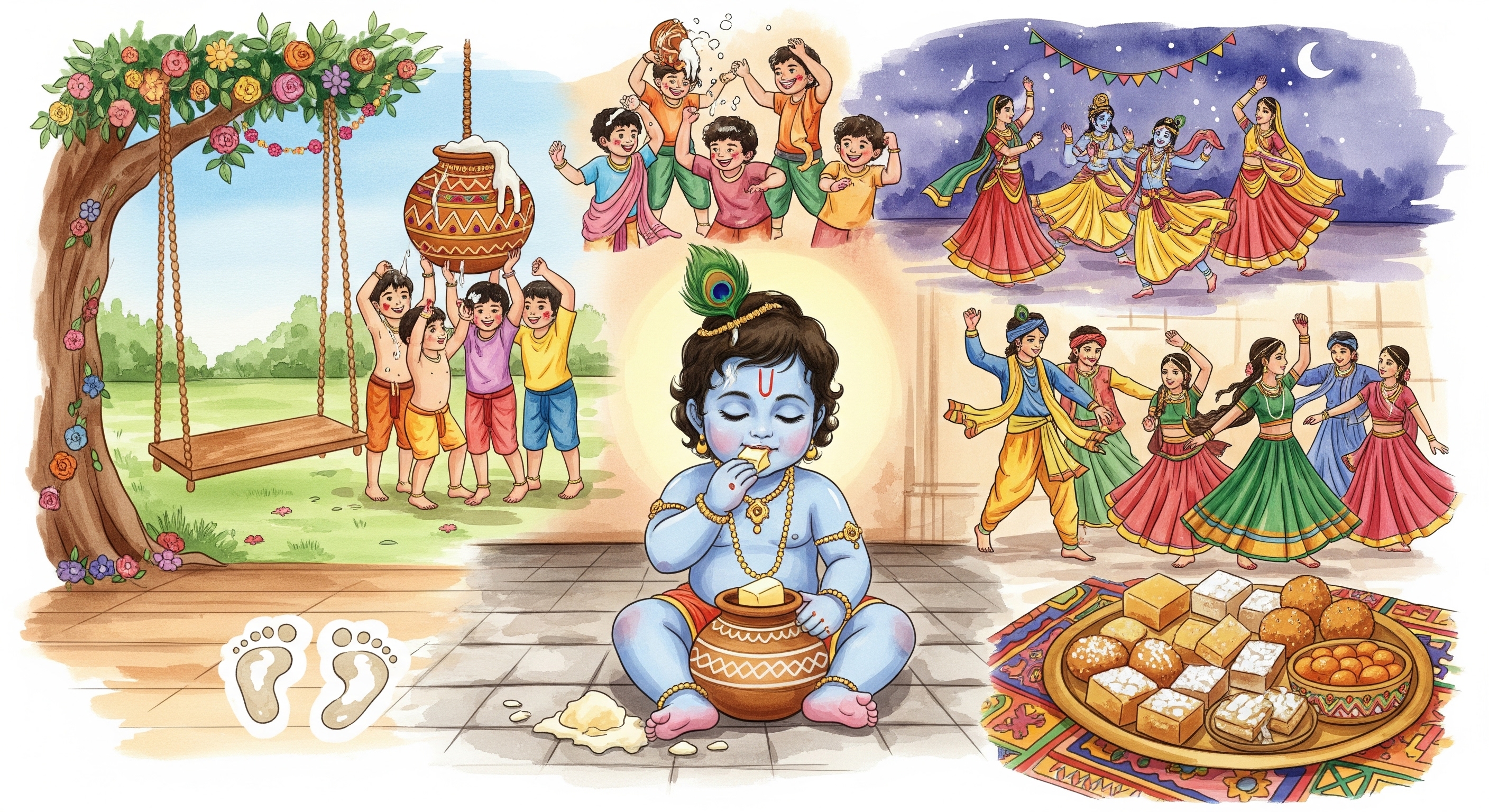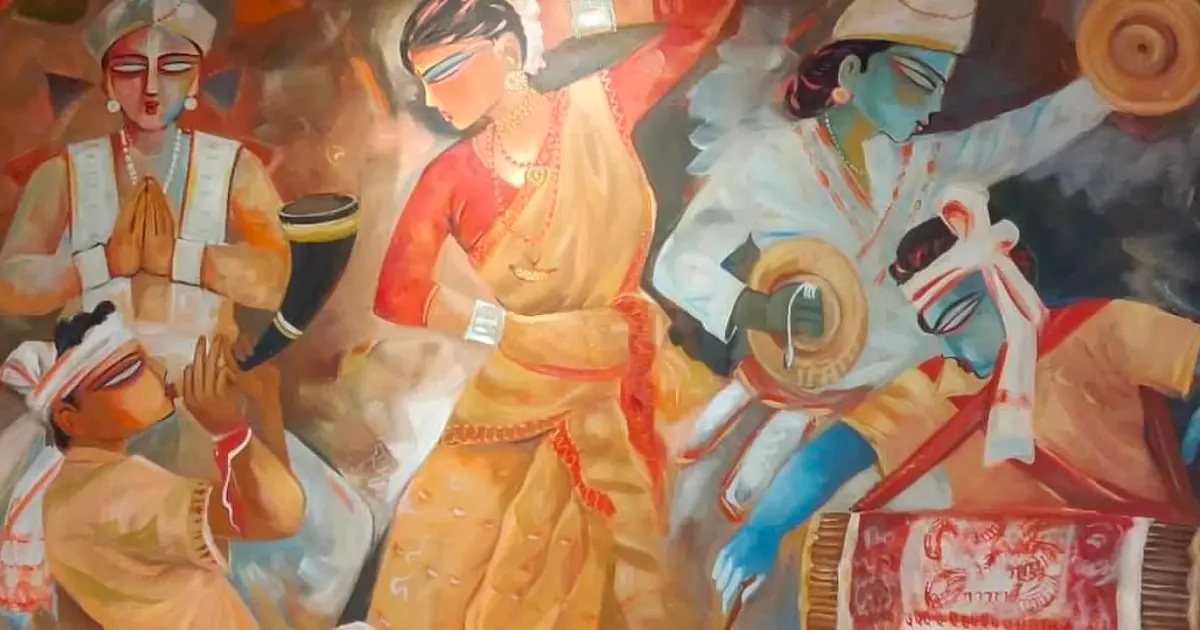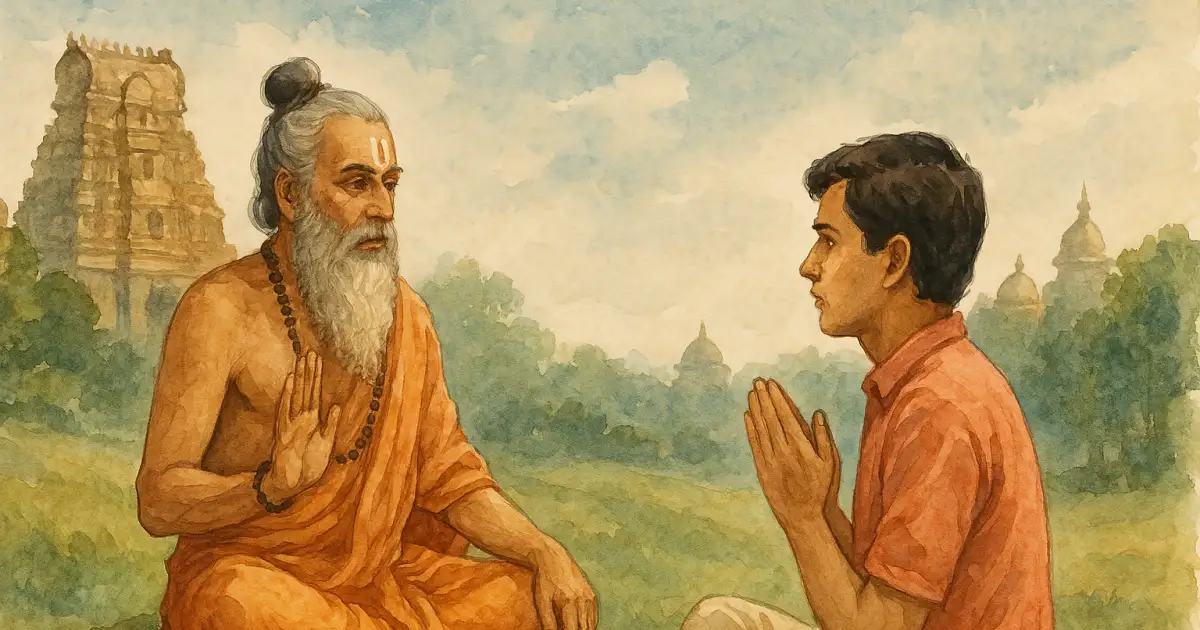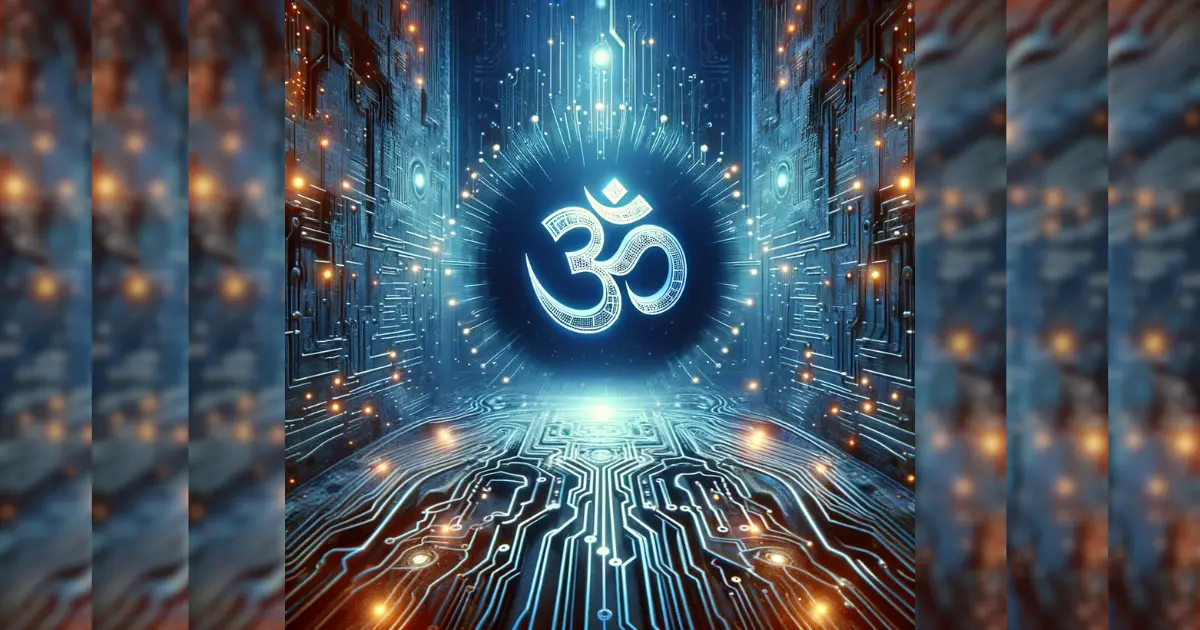Introduction
Janmāṣṭamī is a day of immense joy and celebration as it is the day of Śrīkṛṣṇa's appearance as an avatāra of Lord Viṣṇu in the mortal world, for the upliftment of mankind.
Śrī Krṣṇa’s appearance in the dark of midnight is symbolic of the avatara appearing amidst the immense darkness of adharma, in order to illuminate and rescue the world by establishing Dharma.
It falls on the Kṛṣṇa pakṣa aṣṭamī of its Bhādrapada month (August), as per the pūrṇimānta calendar (wherein the lunar month ends on a full moon day), which is followed in Bihar, Chhattisgarh, Haryana, Himachal Pradesh, Jammu and Kashmir, Jharkhand, Madhya Pradesh, Orissa, Punjab, Rajasthan, Uttarakhand, and Uttar Pradesh. And, it falls on the Kṛṣṇa pakṣa aṣṭamī of the Śrāvaṇa month (August) according to the amāvasyānta calendar (wherein the lunar month ends on a no-moon day), which is followed in Andhra Pradesh, Assam, Gujarat, Maharashtra, Karnataka, Kerala, Tamil Nadu, West Bengal, and Tripura.
Scriptural references
Bhāgavata Purāṇa - Chapter 3
Description of the Birth of Śrīkṛṣṇa
The chapter begins with an auspicious celestial alignment marking the moment of Śrīkṛṣṇa's divine birth.
Śrī Śuka says:
Under the Rohiṇī constellation, the stars, planets, and the natural world exuded serenity and beauty. Despite it being the rainy season (śrāvaṇa), the skies became clear and luminous, and nature rejoiced with blossoming flowers, crystal-clear rivers, and sweetly humming bees. A fragrant, cool breeze filled the air, and the sacred fires burst into flames automatically. The minds of all beings, except the demons like Kaṃsa, were filled with joy. The gods, sages, and celestial beings celebrated with music, dance, and showers of flowers, while the seas roared in harmony.
At midnight, when the world was engulfed in darkness, Lord Viṣṇu manifested himself through Devakī in his divine form, complete with four arms, holding a conch, discus, mace, and lotus. He had the Śrīvatsa mark on his chest, wore the Kaustubha gem, and was adorned with golden ornaments. His complexion was dark like rain clouds, and he wore yellow silk garments. Upon witnessing this divine form, Vāsudeva was filled with awe and joy, realizing that the Supreme Lord himself had incarnated as his son. Overwhelmed with devotion, Vāsudeva gifted ten thousand cows to the Brāhmaṇas.
Realizing the divine nature of the child, Vasudeva, free from fear, offered prayers to the Lord. He praised Viṣṇu as the Supreme Being, beyond prakṛti (material nature), and the eternal witness of all creation. Vasudeva extolled the Lord's transcendence, emphasizing that though he appears to incarnate, he is ever-present and unchanging. The phenomenon of the Lord's entry into Devakī's womb was explained as a mere semblance, as the infinite cannot be contained by the finite. Vasudeva acknowledged the Lord's power of māyā, which makes the unreal seem real. He marveled at the Lord's playful assumption of different forms through the guṇas (qualities)—rajas (creation), tamas (destruction), and sattva (preservation).
Devakī, too, was overcome with reverence and prayed to the Lord. She acknowledged him as the Supreme Brahman, the primordial cause, and the indwelling soul of all beings. She marveled at his omnipresence, his transcendence over time and space, and his role as the protector of devotees. Yet, she feared Kaṃsa and pleaded with the Lord to hide his divine form, assuming that of a regular human baby. She implored Viṣṇu to shield his true identity from Kaṃsa's eyes.
In response, Lord Viṣṇu revealed the divine reason for his incarnation. He disclosed that Vasudeva and Devakī were formerly the sage Sutapas and his wife Pṛśni, who had performed rigorous penance to be blessed with a son like Viṣṇu. Pleased with their devotion, Viṣṇu granted them the boon, incarnating as their son Pṛśni-garbha. In their subsequent life as Kaśyapa and Aditi, Viṣṇu was born to them as Upendra (Vāmana). Now, in their third birth, he once again manifested as their child, fulfilling his promise.
Following this divine revelation, Viṣṇu transformed into an ordinary human infant. Vasudeva, under the influence of Yoga-Māyā's power, found the prison gates miraculously opening. The guards and the people fell into a deep slumber. Carrying the infant Kṛṣṇa on his head, Vasudeva effortlessly crossed the river Yamunā, which parted to make way for him. The serpent Śeṣa shielded the child from the rain with his hood, while the gentle rain fell like a divine blessing.
*Reaching Gokula, Vasudeva found the cowherds in deep sleep. He placed Kṛṣṇa in the arms of Yaśodā, who had just given birth to a daughter (Yoga-Māyā's incarnation), and exchanged the children. He then returned to the prison with the baby girl. As he resumed his place in chains, Devakī and Vasudeva appeared as though nothing had changed. Yaśodā, exhausted from childbirth, remained unaware of the exchange and was too drowsy to recognize the child’s gender.
Agni Purāṇa - Chapter 183
Vow (vrata) observed on the eighth lunar day (Janmāṣṭamī)
The chapter describes the significance of observing the eighth lunar day (Janmāṣṭamī), celebrated as the birth of Lord Kṛṣṇa. Kṛṣṇa, an incarnation of Viṣṇu, was born in the Rohiṇī asterism on this day during the month of Bhādrapada (September–October) at midnight. Due to this divine event, the eighth lunar day is considered highly auspicious and victorious. Fasting on this day is believed to absolve the pāpa of seven generations, offering both enjoyment and spiritual emancipation.
The prescribed worship involves invoking and honoring Kṛṣṇa, Balabhadra (Balarāma), Devakī, Vasudeva, Yaśodā, Nandaka (Nanda), and the cows, symbolizing the pastoral life associated with Kṛṣṇa. The devotee offers repeated obeisance to Kṛṣṇa and various divine forms, including the master of the universe, the lord of sacrifices, and the one who grazes the cows. The rituals involve offering water for bathing, incense for fragrance, flowers for devotion, and lamps to symbolize divine light. The devotee also prays for fragrance, light, and upward spiritual progress.
During the midnight celebration, the image of Kṛṣṇa is bathed with showers of milk, molasses, and clarified butter (ghee), symbolizing purity and divine nourishment. The worshipper gives clothes, gold, and other valuables to Brāhmaṇas as charity and feeds them as part of the ritual, seeking divine blessings.
The chapter highlights the rewards of observing the Janmāṣṭamī vow. Those who perform it gain progeny and attain the world of Viṣṇu. Repeating the vow annually ensures protection from fear and grants riches, longevity, health, virtue, desire, fulfillment, fortune, heaven, and eventual emancipation (mokṣa).
Fire-god (Agni deva) said:
I shall describe the vows (to be performed) on the eighth lunar day. Lord Kṛṣṇa (one of the ten manifestations of lord Viṣṇu) was born unto (the asterism) Rohiṇī on the eighth lunar day in the month of **Bhādrapada* (September-October) at midnight. Hence, the eighth lunar day would be victorious. By fasting on that day, one would become free from sins committed in seven generations.*
Fasting on the eighth lunar day in the dark fortnight in (the month of) Bhādrapada (September-October), marked by (the asterism) rohiṇī, one should **worship lord Kṛṣṇa*, the bestower of enjoyment and emancipation.
Padma Purāṇa - Chapter 13
1. The Importance of the Vow (vrata) of Janmāṣṭamī
Sūta explains to Śaunaka that the Janmāṣṭamī vow (Kṛṣṇāṣṭamī), when performed with devotion, leads the devotee to Viṣṇu’s city along with a crore of their family members, granting them salvation. When Aṣṭamī (eighth lunar day) falls on a Wednesday or Monday in conjunction with the Rohiṇī asterism, its spiritual power is magnified, ensuring the emancipation of the devotee’s entire family.
Observing this vow is said to free even great pāpīs from all pāpa and guarantee their ascent to Viṣṇu’s abode. Conversely, neglecting the vow brings misfortune. Those who fail to observe it are condemned to narka after death, while anyone consuming food on this day also incurs terrible consequences.
2. The Purpose of Kṛṣṇa's Incarnation
The sage Vasiṣṭha narrates the purpose of Kṛṣṇa’s incarnation. The Earth, tormented by cruel kings such as Kaṃsa, appealed to the gods for relief. Overwhelmed by oppression, she wept and sought help from Śiva, who, moved by compassion, approached Brahmā. The gods collectively turned to Viṣṇu, who was resting on the serpent-bed in the milky ocean. They praised him and requested his intervention.
Viṣṇu agreed to be born as Devakī’s son to vanquish Kaṃsa. In preparation:
- Viṣṇu took birth from Devakī, while Pārvatī incarnated as the daughter of Yaśodā in Gokula.
- Viṣṇu, bearing a conch, discus, and mace, left the divine realm for Mathurā.
- After residing in Devakī’s womb for nine months and nine days, he was born during the Rohiṇī asterism on the Aṣṭamī of the dark fortnight of Bhādrapada, amid thundering clouds.
3. The Divine Exchange and Deception of Kaṃsa
At the time of Kṛṣṇa's birth:
- Vasudeva, following Devakī’s plea, carried the infant Kṛṣṇa across the Yamunā to Yaśodā’s house, where she had just given birth to Pārvatī in the form of a girl.
- Despite the river being in spate, Vasudeva crossed it safely due to divine intervention. As soon as he stepped into the water, it miraculously receded to knee-level, allowing him to pass.
- He exchanged Kṛṣṇa for Yaśodā’s daughter and returned to Mathurā.
- When Kaṃsa’s soldiers seized the child, she revealed herself as Gaurī (Pārvatī) and escaped to the sky.
- From the heavens, Gaurī warned Kaṃsa that his true enemy was in Nanda’s house in Gokula, concealed as Kṛṣṇa
4. Kaṃsa’s Attempt to Kill Kṛṣṇa
- Enraged, Kaṃsa ordered the demoness Pūtanā to go to Gokula and kill Kṛṣṇa.
- Disguised as a beautiful woman, Pūtanā entered Gokula with poison-laced breasts to feed the infant. However, Kṛṣṇa, while nursing, sucked the life out of her, granting her liberation.
- As Kṛṣṇa grew, he performed miraculous deeds:
- Hurled Śakaṭa (the cart demon).
- Crushed Tṛṇāvarta.
- Curbed Kāliya (the serpent).
- Eventually, Kṛṣṇa traveled to Mathurā, killed Kaṃsa, and defeated his wrestlers, liberating the kingdom.
5. Benefits of Observing the Janmāṣṭamī Vow (vrata)
Vasiṣṭha describes the benefits of observing Janmāṣṭamī. Simply hearing about the vow destroys pāpa, while observing it brings immense spiritual and material rewards:
- Wealth, health, longevity, and virtue in this life.
- Liberation (mokṣa) and residence in Viṣṇu’s city after death
- It grants the same merit as:
- Visiting Mathurā and beholding Kṛṣṇa’s lotus-like face
- Pilgrimage to Dvārakā and seeing Viṣṇu himself
6. The Story of King Citrasena: Redemption Through the Vow (vrata)
To illustrate the power of the vow, Vasiṣṭha narrates the story of King Citrasena, who was notorious for his adhārmika life:
- He indulged in illicit acts, drank alcohol, ate meat, stole from Brāhmaṇas, and hunted animals relentlessly.
- One evening, while hunting a tiger in the forest, Citrasena became fatigued and thirsty.
- By chance, he came upon a group of Cāṇḍāla women observing the Janmāṣṭamī vow on the banks of the Yamunā. They offered auspicious articles such as sandalwood, flowers, saffron, food, incense, and lamps to Kṛṣṇa.
- Overcome with hunger and thirst, Citrasena approached them but was reminded by the women that eating on Janmāṣṭamī incurs grave spiritual consequences.
- He chose to observe the vow, using a few flowers, sandal, and cloth as offerings.
- At the end of the day, he broke the fast and, due to the power of the vow, ascended to Viṣṇu’s abode in a divine aeroplane, along with his dead ancestors who were also liberated.
7. Rules for Proper Observation of the Vow (vrata)
The correct timing of the vow is emphasized:
- The vow should ideally be observed on Aṣṭamī when conjoined with the Rohiṇī asterism.
- The most auspicious combination is when it falls on a Monday or Wednesday.
- If Aṣṭamī is joined with Navamī, it should still be observed as long as the constellation is partially present.
- The vow can also be observed even if Rohiṇī appears for a short time.
- However, if Aṣṭamī overlaps with Saptamī, it should be avoided, as this combination is considered inauspicious.
Rituals
Devotees wake up early in the morning, take a bath, and prepare sweets made from milk and milk products as bhoga for Lord Kṛṣṇa while observing a fast.
Lord Kṛṣṇa is bathed with milk, Gaṇgājala, and ghee. Then he is dressed in new clothes and jewellery, seated on a swing/jhūlā, an earthen lamp and incense are lit, and pūjā is performed with flowers, fruits, bhajans, chanting, and sweets being offered as prasāda.
The devotees also visit temples and pray to Lord Kṛṣṇa. They break their fast after the ritualistic, “birth of Lord Kṛṣṇa at midnight’’, accompanied by pūjā.
Temples, which are dedicated to Kṛṣṇa, are radiant and dazzling during Janmāṣṭamī. Throughout the day, until midnight, temples are opened to devotees, and Lord Kṛṣṇa is showered with all kinds of offerings, prayers, bhajans, and anuṣṭānas.
South India
Sweets are prepared for Lord Kṛṣṇa. From the door to the temple in the house, child’s footprints are drawn at the entrance, made with a mixture of water and flour - symbolizing that the Lord himself has entered the home. The Bhāgavatam is recited along with devotional songs and dances.
Kerala celebrates it as Rohiṇī Aṣṭamī, **while in some other s*outhern states, it is celebrated as *‘Gokulaṣṭamī**.’ Special snacks and sweets prepared on this day are sedai, aval, rava urandai, butter, murukku, ladoo, kesari, panjamarutham, paal payasam, sundal and lemon rice, etc.
Gujarat
The entire state is up in jubilation and celebrations with an overdrive of shopping, cultural programs, competitions and pūjās happening in almost every home and temple.
Dwārakā, the kingdom of Lord Kṛṣṇa is the main hub of the grand celebrations. Garbā and Rāsa dances are dedicated by devotees to the Lord, celebrating his beautiful pastimes with the gopīs. Traditional sweets like 'Churmā,' 'Panjīrī,' and 'Mohanthāla' are prepared and offered to the Lord.
Maharashtra
Dahī Hāṇḍī ritual is held all over the region. Young boys break a pot filled with curd suspended at a height, symbolizing Lord Kṛṣṇa’s pastimes of breaking the gopīs’ butter pots hanging in their homes, to steal butter. There is a popular belief that if the pot’s broken pieces are kept in the house, it helps remove negative energies.
Mathura and Vrindavan
These dearest places of Lord Kṛṣṇa are where Janmāṣṭamī is celebrated in all its grandeur. Temples here, especially Vrindāvan’s Bānke Bihārī Temple, are a sight to behold with all the beautiful decorations, when devotees visit for darśana of the deity.
Conclusion
Kṛṣṇa Janmāṣṭamī/ Gokulaṣṭam/ Śrī Kṛṣṇa Jayantī is a festival of revering the divine eighth avatāra – Lord Kṛṣṇa. He was born for the restoration of dharma and bestowed the great teachings of the Bhagvad Gīta on humankind, as well as taught us dharma through the epic Mahābhārata.
The vrata of Janmāṣṭamī is a great bestower of worldly and otherworldly gifts and a fulfiller of every wish. It is a spiritual uplifter that helps one attain mokṣa and reach Vaikuṇṭa.
References:
https://www.wisdomlib.org/hinduism/book/the-bhagavata-purana/d/doc1128868.html





